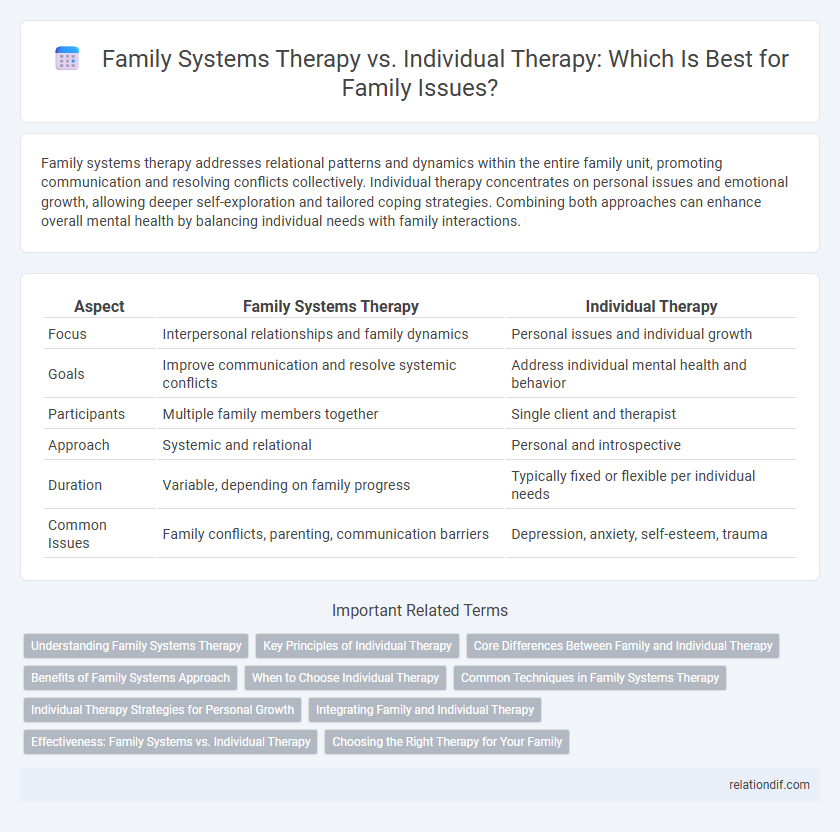Family systems therapy addresses relational patterns and dynamics within the entire family unit, promoting communication and resolving conflicts collectively. Individual therapy concentrates on personal issues and emotional growth, allowing deeper self-exploration and tailored coping strategies. Combining both approaches can enhance overall mental health by balancing individual needs with family interactions.
Table of Comparison
| Aspect | Family Systems Therapy | Individual Therapy |
|---|---|---|
| Focus | Interpersonal relationships and family dynamics | Personal issues and individual growth |
| Goals | Improve communication and resolve systemic conflicts | Address individual mental health and behavior |
| Participants | Multiple family members together | Single client and therapist |
| Approach | Systemic and relational | Personal and introspective |
| Duration | Variable, depending on family progress | Typically fixed or flexible per individual needs |
| Common Issues | Family conflicts, parenting, communication barriers | Depression, anxiety, self-esteem, trauma |
Understanding Family Systems Therapy
Family Systems Therapy explores the interconnected relationships within a family unit, emphasizing how individual behaviors are influenced by family dynamics and patterns. It focuses on communication, roles, and boundaries among family members to promote healing and improve overall functioning. This approach contrasts with Individual Therapy, which centers on personal issues without directly addressing the broader family context.
Key Principles of Individual Therapy
Individual therapy centers on self-exploration, personal responsibility, and emotional regulation to foster mental health. It emphasizes the therapeutic alliance, confidentiality, and personalized treatment goals tailored to the individual's unique psychological needs. Techniques often include cognitive-behavioral strategies, mindfulness, and insight-oriented approaches to enhance self-awareness and coping skills.
Core Differences Between Family and Individual Therapy
Family therapy involves multiple members working together to address relational dynamics and communication patterns, while individual therapy centers on a single person's thoughts, feelings, and behaviors. The core difference lies in the systemic approach of family therapy, which views problems within the context of family interactions, compared to the individual approach focusing solely on personal psychological processes. Family therapy often aims to improve overall family functioning, whereas individual therapy targets personal growth and mental health challenges.
Benefits of Family Systems Approach
Family systems therapy enhances communication patterns by addressing relational dynamics among all family members, promoting collective problem-solving and emotional support. This approach identifies and alters dysfunctional interaction cycles, fostering healthier boundaries and roles within the family unit. Evidence shows it improves long-term outcomes in conflict resolution, mental health stability, and overall family cohesion compared to individual therapy.
When to Choose Individual Therapy
Individual therapy is most effective when addressing personal issues such as anxiety, depression, or trauma that require focused, one-on-one attention. It suits clients seeking self-exploration, emotional regulation, and personal growth independent of family dynamics. Choosing individual therapy is crucial when confidentiality is a priority or when family involvement may hinder honest communication.
Common Techniques in Family Systems Therapy
Family systems therapy commonly employs techniques such as genograms to map family relationships and patterns, structural mapping to identify and modify dysfunctional family interactions, and strategic interventions that target communication and roles within the family unit. Techniques like reframing help shift perspectives on family issues, while enactment encourages family members to act out conflicts during therapy sessions for clearer understanding and resolution. These approaches emphasize the interconnectedness of family members, aiming to improve overall family dynamics and relational functioning.
Individual Therapy Strategies for Personal Growth
Individual therapy strategies for personal growth emphasize self-awareness, emotional regulation, and goal setting to foster lasting change. Techniques such as cognitive-behavioral therapy (CBT), mindfulness practices, and narrative therapy empower individuals to address personal challenges independently of family dynamics. These approaches promote resilience, enhance self-esteem, and support the development of healthy coping mechanisms tailored to individual needs.
Integrating Family and Individual Therapy
Integrating family and individual therapy enhances treatment outcomes by addressing both personal and relational dynamics within the family system. Family systems therapy explores interaction patterns and communication styles, while individual therapy focuses on personal insight and emotional regulation. This combined approach fosters comprehensive healing by promoting understanding, support, and behavior change on multiple levels.
Effectiveness: Family Systems vs. Individual Therapy
Family systems therapy addresses relational dynamics and communication patterns, often resulting in comprehensive behavioral improvements across family members. Individual therapy focuses on personal growth and self-awareness, making it highly effective for treating internalized issues such as anxiety or depression. Research indicates family systems therapy is particularly successful in resolving systemic problems, while individual therapy excels in targeting individual-specific concerns.
Choosing the Right Therapy for Your Family
Family systems therapy addresses relational dynamics and communication patterns among family members, promoting collective healing and improved interactions. Individual therapy targets personal growth, emotional regulation, and self-awareness, benefiting those needing focused mental health support. Choosing the right therapy depends on whether the primary goal is resolving family conflicts or addressing individual psychological needs.
Family Systems vs Individual Therapy Infographic

 relationdif.com
relationdif.com